It was the best of times, it was the worst of times, it was the age of wisdom, it was the age of foolishness...
There seems to be a lot of talk about reading this week. It
has been on the news. The first talk at a conference I attended was on reading and, this week,
at a parents’ evening I spent a lot of my time talking about reading. In fact, for the past three parents’ evenings
I have been suggesting the same thing with lots of lovely parents. This is what
I have suggested they do:
Each day, get your son/daughter to read for ten to fifteen minutes. However, the
reading should be done at the kitchen table and the parents should set their
cooker or microwave timer for ten minutes and the student must read for that
time. They cannot leave the table. They cannot have music on. They cannot have
a laptop or a mobile phone on the table. They must read a book. The parent,
whilst cooking, can monitor the reading and ask them questions about it
afterwards.
This is a complete change of perspective on my part. I
usually float in the ‘liberal lefty’ camp, yet for this aspect only, I am
clearly on the ‘far-right extremist’ training camp. On this issue I am the Jack
Bauer in 24; I AM NOT GOING TO STOP UNTIL I GET THE RESULTS I WANT. Sorry, for shouting, but that is usually how Jack Bauer speaks. Anyway, I have
spent a long time hoping that teenagers would find a love of reading through my
enthusiasm, exposure to excellent books, and pure and simple osmosis. However,
this works for a few, but I think, sadly, it hasn’t worked for most and it
hasn’t worked for all.
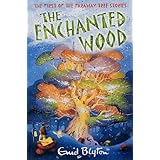 How did I find a love of reading? I wish I could say that I
had an English teacher who inspired me and gave me a novel that I still treasure to
this day, but sadly I don’t have that experience. I have talked about enjoying
studying a book, but the spark that turned me into a ‘reader’ was a funny one. My
first reading experience I remember is Mrs. Glasson reading ‘The Enchanted
Wood’ by Enid Blyton. I loved the experience, because I got to hold a teddy
bear, with dungarees, as the story was read to us. Then, the rest of primary
school was a dry patch in reading. I read one or two books about Greek
mythology and on birds. The RSPB kind and not the other kind. Yet, I read very
little else.
How did I find a love of reading? I wish I could say that I
had an English teacher who inspired me and gave me a novel that I still treasure to
this day, but sadly I don’t have that experience. I have talked about enjoying
studying a book, but the spark that turned me into a ‘reader’ was a funny one. My
first reading experience I remember is Mrs. Glasson reading ‘The Enchanted
Wood’ by Enid Blyton. I loved the experience, because I got to hold a teddy
bear, with dungarees, as the story was read to us. Then, the rest of primary
school was a dry patch in reading. I read one or two books about Greek
mythology and on birds. The RSPB kind and not the other kind. Yet, I read very
little else.
At secondary school things got a little better. I found out
in Year 7 that there were novels of Doctor Who stories I hadn’t seen. Then,
over a three year period, I bought hundreds of these books. They were simple,
straight-forward prose, but I bloody loved them. As I got older my interest waned a bit and I
read less and less.
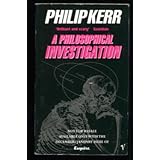 At the age of 18 I went on holiday with some friends. I had
an accident and knocked myself out. The
next night I decided to sit and read, while the others went out. On the journey
to Ibiza, I had picked up a magazine with a free copy of a novel. The novel was ‘The
Philosophical Investigation’ by Phillip Kerr. From that moment on, I devoured
books on a weekly basis and I keep doing that to this day. I read, read and
read some more. I got on to the classics soon enough and grew to love D. H.
Lawrence, Thomas Hardy, Charles Dickens, Iain Banks, Ian McEwan, Susan Hill,
Sarah Waters and many more. But what sparked that interest in reading wasn’t
really a teacher, or a worthy literary text (sorry, Kerr), it was a dull,
boring, nothing to do situation. Books sell themselves. People just need to
read them and give them time. ‘To Kill a
Mockingbird’ is a superb novel, but you could easily lose interest based on the
opening.
At the age of 18 I went on holiday with some friends. I had
an accident and knocked myself out. The
next night I decided to sit and read, while the others went out. On the journey
to Ibiza, I had picked up a magazine with a free copy of a novel. The novel was ‘The
Philosophical Investigation’ by Phillip Kerr. From that moment on, I devoured
books on a weekly basis and I keep doing that to this day. I read, read and
read some more. I got on to the classics soon enough and grew to love D. H.
Lawrence, Thomas Hardy, Charles Dickens, Iain Banks, Ian McEwan, Susan Hill,
Sarah Waters and many more. But what sparked that interest in reading wasn’t
really a teacher, or a worthy literary text (sorry, Kerr), it was a dull,
boring, nothing to do situation. Books sell themselves. People just need to
read them and give them time. ‘To Kill a
Mockingbird’ is a superb novel, but you could easily lose interest based on the
opening.
Do we have the right environments for students to enjoy
reading? Everything in modern life is designed to entertain, grab, hold and
keep you coming back for more. Life seems to be punctuated now with the phrase,
“Stay tuned as in the next five minutes we will see what the secret to becoming
rich is.” Even this week I struggled to read a book one night because there was
an interesting conversation on Twitter, and I wanted to see how it
progressed. Anyway, students sit down at the end of the school day and what
have they got to relax and entertain them?
·
MP3 player
·
A kindle – other ebook readers are available
·
An iPad
·
An iPhone or a smart phone
·
PS3 or a DS
·
A laptop
·
TV
·
DVDs
·
A board game
·
A book
Now, if I was in room with all of these, I would struggle to
jump to a book. Is it any wonder that our students rarely read a home? Is there
any wonder why students fail to be interested in reading? All of these items
on the list scream for attention. Look how interesting we are! A book in that
line-up is the one that is silent, modest and unassuming. It hides.
Growing up for me was
very hard in comparison. I had four channels to watch on TV. Usually, the best
programmes had finished by five o’clock, and then it was the news. I didn’t
fancy watching ‘World in Action’ which was on later. Maybe I should play on the
computer instead. I would then wait ages for the tape to spool information to
the graphically challenged computer. Often, it would fail and you would have to
start the whole process again. Maybe I should listen to music instead. I’d
listen to my Walkman, which would quickly run out of charge as it ate batteries
up like a gorilla eats bananas. Finally, I would read a book. Adopts Hovis
advert voice-over: In my day, I would be
left with lots of free time and not much to do, so I would read to fill my
time.
Today students don’t have the time or the space to enjoy
reading. They do, and, can enjoy reading. Ask any English teacher what one of the
key guns in their behaviour arsenal is? Usually, they will say reading. You can
hear a pin drop when a novel is read in class. It can settle a class easily.
For DT it is the danger element of equipment that could slice your hand off.
For PE it is the joy of playing a game. For English it is reading a book.
It could be argued that students today are reading in a
different way. Reading Tweets, Facebook and other things on a screen is still
reading. English teachers need to get used to the new situation. This is the
modern world, so get used to it. However, I don’t think the novel is dead yet.
Parents are always telling me how they love reading and they are disappointed
by their son’s / daughter’s lack of interest. There’s my army. I have the
parents onside. They want them to read more. I want them to read more. We just
need to get the students to read more. We need to find ways to light the blue
touch paper and stand back as the student enjoys reading.
Films
The film industry is our biggest ally. They make often
excellent versions of books. Thankfully, they love making a series or a
trilogy. And, thankfully, there is usually a gap of two or three years between parts
in a trilogy. The gap is the perfect opportunity to get students hooked. Harry
Potter’s success snowballed between films and books. More and more people got
hooked. Get students interested in a book through the film adaptations. For
decades now there have been film tie-in books. Get them reading through films.
Did you like the ‘Hunger Games’?Yes, well there are two more books, which you will love. Or, would your rather wait a year for the next part in the cinema?

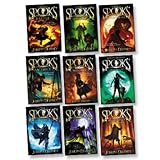 Also, the film industry loves hype. It loves creating the
new best thing. Oh, look everyone else is reading that book. Gosh, reading has
got like that now. The hype of ‘Fifty Shades of Grey’ got me interested in the book. Sadly,
the book is not my cup of tea, or remotely interesting. Like most people, I
wanted to know why everybody was raving about it. Let’s, as teachers, create
and build on that kind of hype and build it about other books. Let’s try and pick the next best thing and rave and
rave about it and talk to students openly in class who have read said
book. Get students interested through ‘keeping
up with the Joneses’ . A book I think is going to be a big thing – I could get
this wrong – is by Joseph Delaney (an ex-English teacher)and it is called ‘The Spook’s Apprentice’.
I have read the series and it is creepy, boy and girl friendly and a good yarn.
Plus, there is a film being filmed now. Start the hype now!
Also, the film industry loves hype. It loves creating the
new best thing. Oh, look everyone else is reading that book. Gosh, reading has
got like that now. The hype of ‘Fifty Shades of Grey’ got me interested in the book. Sadly,
the book is not my cup of tea, or remotely interesting. Like most people, I
wanted to know why everybody was raving about it. Let’s, as teachers, create
and build on that kind of hype and build it about other books. Let’s try and pick the next best thing and rave and
rave about it and talk to students openly in class who have read said
book. Get students interested through ‘keeping
up with the Joneses’ . A book I think is going to be a big thing – I could get
this wrong – is by Joseph Delaney (an ex-English teacher)and it is called ‘The Spook’s Apprentice’.
I have read the series and it is creepy, boy and girl friendly and a good yarn.
Plus, there is a film being filmed now. Start the hype now!
Waterstone's
Toys ‘R Us was my version of Heaven as a child. The only
thing it missed was fluffy clouds. However, I think my new version of Heaven is
Waterstone's. The teenage fiction section is fabulous now. Compare things to the
90s book shops and you’ll know what I mean. Even Tescos is better for teenage
fiction than most book shops in the 90s. There are hundreds of appealing books
that are crafted and decorated to interest a student. Parents ask me for a
reading list and I am struggling more and more to provide one as there are so many
new books. The list I gave last year is a bit outdated. Get a teenager to a
shop and get them to pick a book that interests them. Get them to read the
blurbs. Get them to read the first lines. Teenagers hate being told what to do
most of the time. That is why it is better to get them to make the choices,
rather than thrust a book in their direction and insist in them reading it. I
loved it as a teenager, so you will love it too. Umm, I don't think so, Dad. 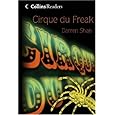 For boys, I tend to direct them to ‘Cirque Du Freak’ by
Darren Shan. It is old now, but I have
read it with numerous boys and they have loved it. It is pacey and has lots of
grim stuff and short chapters.
For boys, I tend to direct them to ‘Cirque Du Freak’ by
Darren Shan. It is old now, but I have
read it with numerous boys and they have loved it. It is pacey and has lots of
grim stuff and short chapters.
Non-fiction
The non-fiction world is much more varied than the fiction one
at times. I would argue students would connect better with reading if we placed
a greater emphasis on these kinds of whole texts in schools. It is always about
reading a story. Reading some fiction that isn’t real and relatable to that
student’s experience. It is purely escapism. Non-fiction is more relevant than
fiction. It is about real things, real people and real information. Look at this biography of a celebrity you
like. Isn’t it interesting how they felt the same way you do about school when
they were a teenager?
So you love cars, read a book about cars. In my teenage
years, I got interested in reading about famous haunted landmarks. It was a niche
area of books, but I devoured them. Now on reading lists produced by other
departments, I have yet to see a selection about real ghost sightings, yet it
had me interested. Could the fact that majority of English teachers are ‘literature’
teachers at heart be a drawback in getting students to read? I love literature,
so you will love it. Personally, I adore Charles Dickens, but I would never
recommend his books to students. I would rather they read full stop. Some
engage in literature and some don’t.
Plus, put a novel and One Direction biography before a
student. I bet their hand will rush to the biography.
My daughters have just started reading the lovely ‘Biff and
Chip’ books. They are excited by the books. They love them, but I can imagine
ten years down the line when they will turn their noses up at books. Then I
will lock them in a room and wait and wait until they admit to reading and
engaging in reading. I have my battle plan ready.
I organise a lot of reading activities in my school. I run a
‘Readathon’, shadow the Carnegie CILIP Book Award for students, shadow the Man Booker
Prize (current shortlist is quite depressing) with adults and many more things to promote reading. Often, the readers
will read and the reading-phobic stay phobic about reading. I create the
opportunities for reading, but maybe, just maybe, something a little bit
drastic is needed. I am not suggesting ‘waterboarding’ or any other techniques
of torture, but maybe we switch things off for students and get them to focus
on one thing and learn to enjoy it.
It isn’t always our place to enthuse people about reading; I think books do that for us. I think it is our place to make reading happen.
Xris32
P.S. Here are just a few books that I recommend teachers to read, because they are bloody good.
- 'A Monster Calls' by Patrick Ness
- 'Revolver' by Marcus Sedgewick
- 'Across the Nightingale Floor' by Lian Hearn
- 'The Knife of Never Letting Go' by Patrick Ness - and the whole series
- 'The Dead of Winter' by Christopher Priestly
- 'Mortal Engine' by Phillip Reeve
Book images are from: http://www.amazon.co.uk/
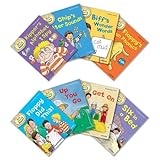
No comments:
Post a Comment
Note: only a member of this blog may post a comment.